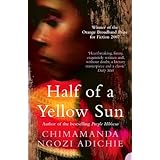Today I read the first half of
Lolita by Vladimir Nabokov. I was impressed by many things including the wit (mainly because I wasn't expecting it) and the man's vocabulary/ I made a list of the less familiar words he used below (some of which I have tried learning before, but since they haven't stuck, I'm trying again)
ribald = humorously vulgar.
torrid = emotionally charged and physically energetic, hot, intense
phocine = relating to seals
nacreous = resembling mother of pearl
nates = buttocks
dolour = painful grief
nictate = blink
limpid = clear and bright
pederosis = pedophile
davenport = small desk or sofa
solipsism = philosophy that the self is the only thing that exists
seraglio = living quarters reserved for women and servants in Muslim household.
iliac = pertaining to the hip bone
incubus = male demon believed to have sexual intercourse with a sleeping female, situation like a nightmare, a person who depresses others
incarnadine = make flesh coloured
eructation = belching or erupting
duenna = a woman chaperon
philtre = drink which makes the one who drinks it fall in love with the one who gives it.
nonce = the present occasion
lentigo = small brown spot on the skin
umbra = shadow caused by interruption of light
According to Wikipedia, he was fluent in three languages (French, Russian and English) at an early age because they were all spoken at home. He was also an expert on insects and had a vast collection of the genitalia of a certain blue butterfly because he believed that by microscopic examination of the differences was the best means of classifying them. I expect he would have loved silkworms.
 Imogen Rhia Herrad is a remarkable person. She's German and can speak fluent English, Spanish and Welsh. Once, whilst teaching in a school in Aberystwyth, she learnt of the Welsh in Patagonia and decided to go there. Beyond the Pampas tells of her journeys in Patagonia. In some ways it is a travelogue, in some ways a search for history, but perhaps more than anything else it is a search for self.
Imogen Rhia Herrad is a remarkable person. She's German and can speak fluent English, Spanish and Welsh. Once, whilst teaching in a school in Aberystwyth, she learnt of the Welsh in Patagonia and decided to go there. Beyond the Pampas tells of her journeys in Patagonia. In some ways it is a travelogue, in some ways a search for history, but perhaps more than anything else it is a search for self. 

























